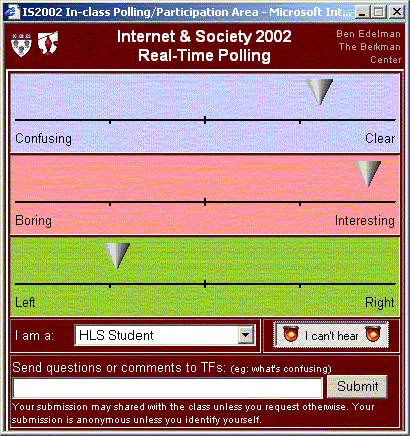Defensive Registrations: Why They’re Still Needed, and How to Make Them Earn Their Keep. Verisign Digital Brand Management Services – Digital Branding Bulletin. (December 2002)
Invalid WHOIS Data: Who Is Responsible? CircleID. (November 2002)
Empirical Analysis of Internet Filtering in China – full article.
The authors are collecting data on the methods, scope, and depth of selective barriers to Internet access through Chinese networks. Tests from May 2002 through November 2002 indicate at least four distinct and independently operable methods of Internet filtering, with a documentable leap in filtering sophistication beginning in September 2002. The authors document thousands of sites rendered inaccessible using the most common and longstanding filtering practice. These sites were found through connections to the Internet by telephone dial-up link and through proxy servers in China. Once so connected, the authors attempted to access approximately two hundred thousand web sites. The authors tracked 19,032 web sites that were inaccessible from China on multiple occasions while remaining accessible from the United States. Such sites contained information about news, politics, health, commerce, and entertainment. See highlights of blocked pages. The authors conclude (1) that the Chinese government maintains an active interest in preventing users from viewing certain web content, both sexually explicit and non-sexually explicit; (2) that it has managed to configure overlapping nationwide systems to effectively — if at times irregularly — block such content from users who do not regularly seek to circumvent such blocking; and (3) that such blocking systems are becoming more refined even as they are likely more labor- and technology-intensive to maintain than cruder predecessors.
Revised and published as Internet Filtering in China (IEEE Internet Computing 2003).
The authors are studying exclusions from search engine search results, and have found some 113 sites excluded, in whole or in part, from the French google.fr and German google.de compared with google.com. Learn more about the situation and context, test the exclusions for yourself, and submit further sites suspected to be excluded. Full article.
TLD Registration Enforcement: A Call for Automation – Part I and Part II. CircleID. (September – October 2002)
The authors are studying Internet filtering in countries worldwide, and current investigations focus on restrictions on web access in China. Using a web-based system to test web filtering in China, the authors previously determined and confirmed that Google was inaccessible from at least one testing location in China; initially, in testing beginning August 29, a request for Google led to the error “host not found,” consistent with requests for other inaccessible or blocked sites. However, using related methods, the authors have now confirmed and documented reports that Chinese Internet access currently provides pages other than the ordinary Google home page in response to requests for google.com; such behavior is believed to have begun on September 8. The screen shots in this article document six instances of this replacement. Full article.

The Real-Time Polling System is allows students and other meeting participants to express comments immediately viewed by the instructor or, optionally, the entire class. In one application, the system might present a slider with extremes labeled “I am confused” and “I understand”; when sufficiently many students move their sliders sufficiently towards the “confused” end of the spectrum, the instructor might be automatically alerted to pause for review or questions from students. The system can also be configured with buttons, checkboxes, drop-down lists, and free-response text boxes, and it can perform crosstab analysis, automatically reporting results split according to relevant demographic or other characteristics. Results are ordinarily displayed on a projection screen at the front of the room and/or on administrative consoles. Textual responses are integrated with the Participant Response Display Mechanism.
Details in Berkman Center Meeting Tools.
I found that iCravetv.biz and Entervision retransmitted CNN, Cartoon Network, PAX TV, and a California NBC Affiliate — an urgent concern in light of contemporaneous disputes about video retransmission. Details and screenshots.
Survey of Domain Registration Services. (August – November 2003)
Numerous competitive registrars offer diverse domain registration services to individuals, companies, and organizations. This site attempts to index and analyze their service offerings, facilitating analysis by other researchers and in preparation for additional analysis by the author.
Interested registrars have completed a survey of service offerings, and this page summarizes results. Surveys remain available for those additional registrars who care to submit information about their services.
Survey of Usage of the .US TLD. (August – September 2002)
Recent policy changes allow registrations in .US with few restrictions. The author collects data about all known .US registrations, analyzing their registration patterns and usage. Certain registrants are found to register more than 2,000 domains each; these registrants may be gathering domains for commercial applications requiring many domains or for future sale, and large registrants (with ten or more .US domains) jointly hold a total of 46.4% of .US registrations to date. Non-Americans are found to register 7.0% of domains, and some of these registrations may violate .US registration restrictions that require nexus in the United States. The overwhelming majority of .US registrations as yet provide no original web content; working .US web sites are found to be clustered with certain registrars, while certain other registrars tend to register domains that offer no web content and domains offered for resale.